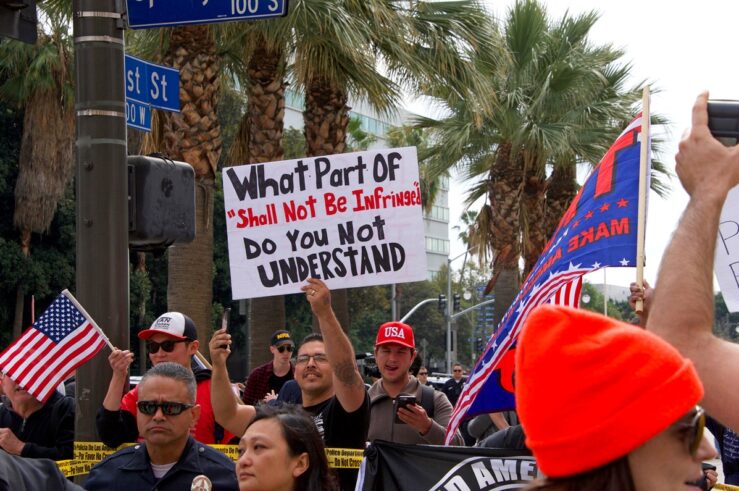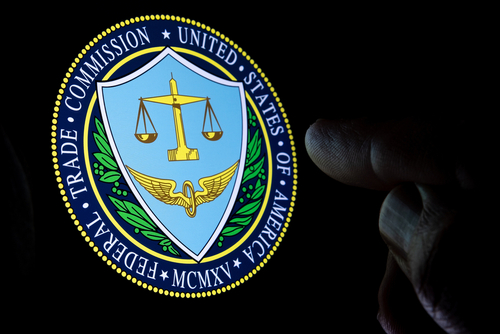Showing archive for: “Insurance”
Vullo and the Dangers of Government Coercion Over Speech
The U.S. Supreme Court delivered a major victory for free speech and struck a blow against government censorship-by-proxy yesterday in NRA v. Vullo: “Government officials cannot attempt to coerce private parties in order to punish or suppress views that the government disfavors.” This is a major decision, and will have implications for free speech online, ... Vullo and the Dangers of Government Coercion Over Speech
Why I’m a Skeptic of a Noncompete Ban
Under a recently proposed rule, the Federal Trade Commission (FTC) would ban the use of noncompete terms in employment agreements nationwide. Noncompetes are contracts that workers sign saying they agree to not work for the employer’s competitors for a certain period. The FTC’s rule would be a major policy change, regulating future contracts and retroactively ... Why I’m a Skeptic of a Noncompete Ban
After the FTX Crash, What’s Next for Crypto?
For many observers, the collapse of the crypto exchange FTX understandably raises questions about the future of the crypto economy, or even of public blockchains as a technology. The topic is high on the agenda of the U.S. Congress this week, with the House Financial Services Committee set for a Dec. 13 hearing with FTX ... After the FTX Crash, What’s Next for Crypto?
Taking Cost-Benefit Analysis Seriously in Consumer-Data Regulation
In its Advance Notice for Proposed Rulemaking (ANPR) on Commercial Surveillance and Data Security, the Federal Trade Commission (FTC) has requested public comment on an unprecedented initiative to promulgate and implement wide-ranging rules concerning the gathering and use of consumer data in digital markets. In this contribution, I will assume, for the sake of argument, ... Taking Cost-Benefit Analysis Seriously in Consumer-Data Regulation
Antitrust’s Uncertain Future Roundup: The Minority Report
[TOTM: The following is part of a digital symposium by TOTM guests and authors on Antitrust’s Uncertain Future: Visions of Competition in the New Regulatory Landscape. Information on the authors and the entire series of posts is available here.] Philip K Dick’s novella “The Minority Report” describes a futuristic world without crime. This state of the ... Antitrust’s Uncertain Future Roundup: The Minority Report
New Frontiers of Fairness: Auto Da Fé by the Grand Inquisitor of Economics
July 26, 10 A.F. (after fairness) Dear Fellow Inquisitors, It has been more than a decade now since the Federal Neutrality Commission, born of the ashes of the old world, ushered in the Age of Fairness. As you all know, the FNC was created during the Online Era, when the emergence of the largest companies ... New Frontiers of Fairness: Auto Da Fé by the Grand Inquisitor of Economics
How the FTC Could, but Won’t, Use Its Rulemaking Authority to Allow Aftermarket Parts
We used to have a robust aftermarket for non-original equipment manufacturer (OEM) automobile repair parts and “independent” repair services, but car companies have increasingly resorted to design-patent protection to prevent competition in the supply of cosmetic repair parts such as bumpers, hoods, panels, and mirrors. The predictable and intended consequence has been to raise prices ... How the FTC Could, but Won’t, Use Its Rulemaking Authority to Allow Aftermarket Parts
Fleites v. MindGeek Contemplates Significant Expansion of Collateral Liability
In Fleites v. MindGeek—currently before the U.S. District Court for the District of Central California, Southern Division—plaintiffs seek to hold MindGeek subsidiary PornHub liable for alleged instances of human trafficking under the Racketeer Influenced and Corrupt Organizations (RICO) and the Trafficking Victims Protection Reauthorization Act (TVPRA). Writing for the International Center for Law & Economics ... Fleites v. MindGeek Contemplates Significant Expansion of Collateral Liability
Intermediaries: The Hero We Need?
In policy discussions about the digital economy, a background assumption that frequently underlies the discourse is that intermediaries and centralization always and only serve as a cost to consumers, and to society more generally. Thus, one commonly sees arguments that consumers would be better off if they could freely combine products from different trading partners. ... Intermediaries: The Hero We Need?
How Changing Section 230 Could Disrupt Insurance Markets
In recent years, a diverse cross-section of advocates and politicians have leveled criticisms at Section 230 of the Communications Decency Act and its grant of legal immunity to interactive computer services. Proposed legislative changes to the law have been put forward by both Republicans and Democrats. It remains unclear whether Congress (or the courts) will ... How Changing Section 230 Could Disrupt Insurance Markets
The Problem of Data Property Rights
Policy discussions about the use of personal data often have “less is more” as a background assumption; that data is overconsumed relative to some hypothetical optimal baseline. This overriding skepticism has been the backdrop for sweeping new privacy regulations, such as the California Consumer Privacy Act (CCPA) and the EU’s General Data Protection Regulation (GDPR). ... The Problem of Data Property Rights
The DOJ’s Antitrust Case Against Google: A Tough Slog, but Maybe an Intriguing Possibility?
The U.S. Department of Justice’s (DOJ) antitrust case against Google, which was filed in October 2020, will be a tough slog.[1] It is an alleged monopolization (Sherman Act, Sec. 2) case; and monopolization cases are always a tough slog. In this brief essay I will lay out some of the issues in the case and raise ... The DOJ’s Antitrust Case Against Google: A Tough Slog, but Maybe an Intriguing Possibility?
















